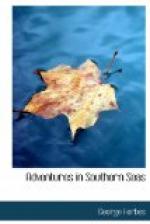As luck would have it, an incident now occurred which, for the time, diverted the men’s minds from the dangerous brooding in which they had indulged. A dark line appeared on the horizon, which at first we took for a breeze, but which, as it swept down upon us, proved to be a prodigious number of flying fish. These delicate creatures rose out of the water like silver clouds, and as they passed over our Vessel numbers fell upon our decks. These fish are excellent eating, and of those that fell aboard of us we soon had an ample supply. Hartog, as much to give the crew some novel occupation as from any other motive, set the men to work salting and drying the fish, so that we secured three barrels full, as an addition to our ordinary fare, which was very acceptable. The flying fish were pursued by a shoal of dolphins, which continued to play round our ship for several days, and some of these we captured with the line and converted into food.
In the excitement of the sport the sailors soon forgot their mutinous conduct, and resumed something of their former cheerfulness. Like children, seamen are easily led and readily influenced.
“I thank Providence,” declared Hartog, “for the draught of fishes sent to us at so opportune a time; but for their coming I doubt we would have been at each other’s throats ere this.”
And indeed there is more in chance and circumstance than most believe.
I observed that Van Luck took no part in the fishing. The sport in which the seamen were engaged appeared to afford him more irritation than amusement.
I often wondered that Hartog did not note the surly demeanour of his chief officer. But he did not appear to do so, and it was no part of my duty to make mischief between the captain and his first mate.
When the fishing and salting were over, a breeze sprang up which freshened to half a gale—before which we scudded under furled mizzen and foresails. The men had now plenty to do, and there was no time for brooding or lamenting over lost hopes. It is mostly during a calm, when the ship rides motionless upon a painted sea, that mutinous and rebellious thoughts arise among seamen. When the vessel is ploughing her way through storm and stress, each man seems a part of the ship and to have an interest in her voyage. It is then, too, that the word of command carries weight and meaning, and the knowledge of common dependence upon the captain makes for obedience and discipline, so that while the gale lasted we had no fear of mutiny.
At the end of a week, during which time we covered many leagues of sea, the weather moderated, when we found ourselves once more among the islands of the South Seas, and the thoughts of being again on shore, and the adventures that might be in store for us, put to flight less wholesome and healthy thoughts.
By the time we came in sight of the islands Janstins had recovered his spirits, and Hartog his good humour. Janstins, who was of a sanguine disposition, began to speculate upon our chances of finding treasure, and Hartog predicted that fortune stood upon the shores of one of these pleasant islands to welcome us, and send us home rich men.




